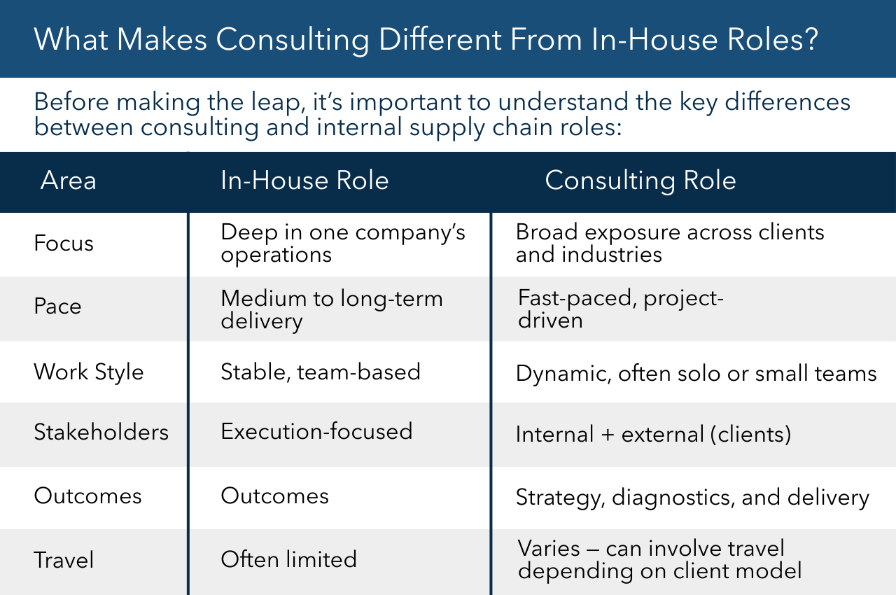
How to Get Into Supply Chain Consulting (And What You Need to Know Before You Do)
Supply chain consulting is a dynamic and rewarding career path — one that combines problem-solving, strategic thinking, and the ability to make a real impact across industries. But breaking into consulting is a bit different from stepping into an in-house supply chain role.
Here’s a guide on how to get into the field — and what you really need to know about consulting before you do.
What Is Supply Chain Consulting?
Supply chain consultants work with organisations to solve complex operational challenges, improve performance, and drive efficiencies across areas like:
Procurement and sourcing
Inventory management
Logistics and distribution
Network design
Technology implementation (e.g., ERP, WMS, TMS)
Supply chain strategy and transformation
You might be brought in to design a new planning process, reduce freight costs, implement a new system, or lead a full supply chain transformation.

Skills You Need to Succeed in Supply Chain Consulting
Supply chain knowledge is only one part of the puzzle. To succeed in consulting, you’ll also need:
1. Structured Problem Solving
Consultants are expected to break down complex problems into clear, actionable steps. Framework thinking and comfort with ambiguity are essential.
2. Strong Communication Skills
You’ll need to explain complex supply chain issues to non-technical stakeholders, write reports, and lead client-facing workshops.
3. Stakeholder Management
Consultants often work with senior leaders — and need to build trust fast. This means managing expectations, influencing decisions, and navigating different personalities.
4. Analytical Thinking
Data is key. Whether it's building a model, running a cost-benefit analysis, or validating system outputs, strong Excel and analytics skills are a must.
5. Commercial Awareness
Consultants don’t just “solve” problems — they help clients make decisions that align with budget, business goals, and competitive pressures.
6. Agility
You may be assigned to one project for 4–8 weeks or work across two projects concurrently. This requires the ability to be flexible and adapt quickly to changing priorities.
How to Break Into Supply Chain Consulting
1. Leverage Your Industry Experience
Most firms value professionals with real-world supply chain experience. Use your operational knowledge to position yourself as someone who understands the realities of the shop floor and the boardroom.
2. Upskill in Key Consulting Tools
Familiarise yourself with:
Process mapping (e.g., Visio, Lucidchart)
Data analysis (Excel, Power BI, SQL basics)
Project management methodologies (Agile, Prince2)
Change management fundamentals
3. Start With Project Roles or Advisory Work
If you’re in an in-house role, look for secondments or cross-functional projects that expose you to transformation work. Vendor implementations, restructures, or cost reduction programs are good experience.
4. Consider Boutique or Specialist Firms
You don’t have to start with the Big 4. Many mid-sized or niche supply chain consulting firms value practical experience over consulting polish. These firms can offer broader exposure and hands-on project work.
5. Network and Stay Visible
Get involved in industry groups (like SCLAA or ASCI), attend events, and connect with consultants and recruiters who specialise in supply chain. Many consulting roles are filled through referrals and networks.
What to Expect Once You’re In
Projects can be intense — expect changing deadlines, high client expectations, and steep learning curves.
You'll learn fast — working across multiple businesses accelerates your growth.
You’ll never stop improving — consulting exposes you to new tech, methods, and business models all the time.
It’s not for everyone — but if you like variety, challenge, and continuous learning, it can be incredibly rewarding.
Final Thoughts
Supply chain consulting is an exciting career path for those who want to solve big problems and create lasting impact. If you’re naturally curious, commercially minded, and thrive in dynamic environments, it might just be your next move.
